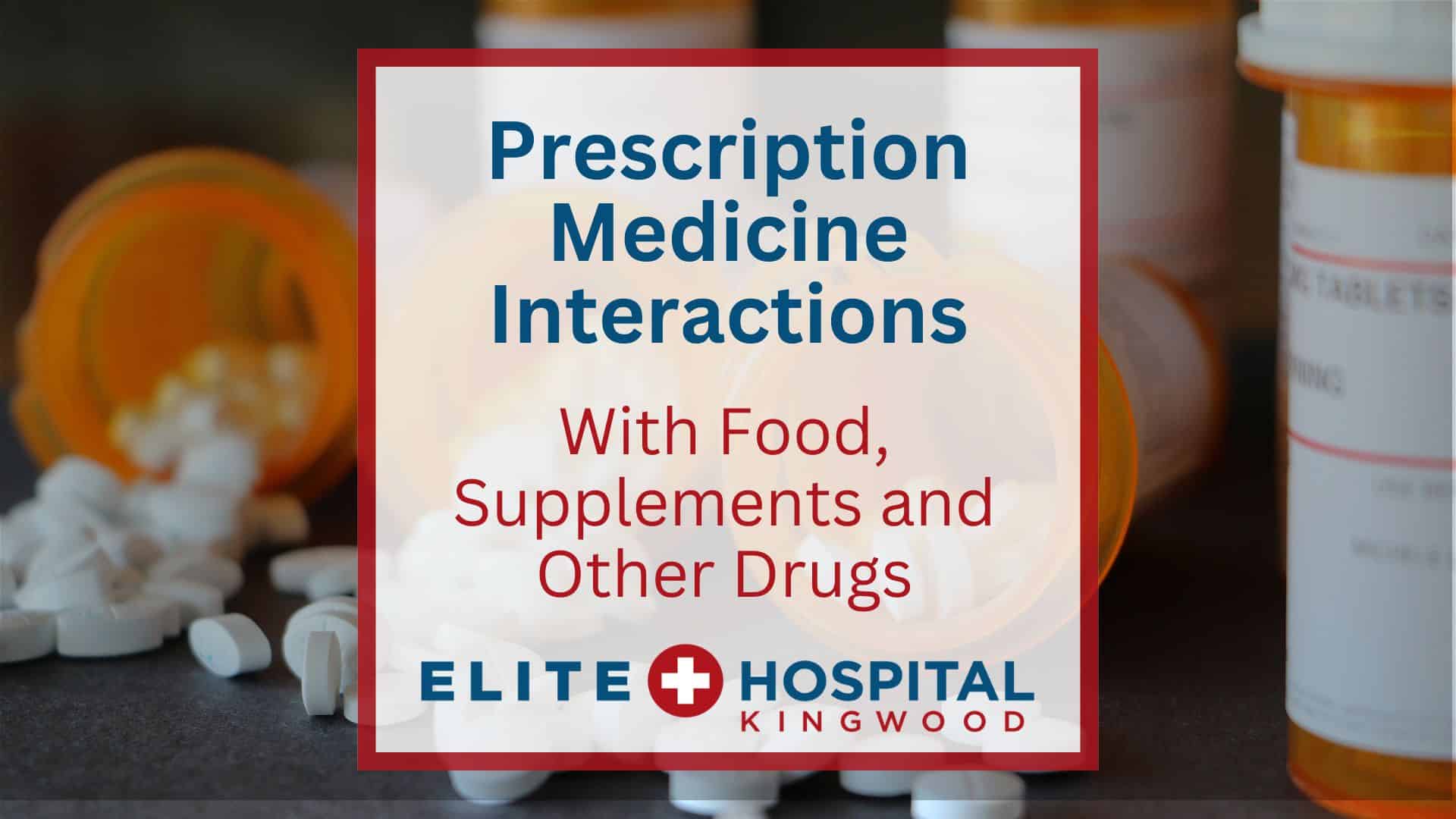
Medication plays a vital role in managing your health and staying on top of your well-being. However, many people may not be aware of the potential interactions that can occur between medications, the foods we eat, supplements we take, and other over-the-counter or prescribed drugs. These interactions can significantly impact the effectiveness of medications and may even cause harmful side effects. This is why understanding and recognizing these interactions is important for maintaining your health.
At Elite Hospital Kingwood, we frequently see patients who are unaware of these risks. Our goal is to help educate the community so that you can make informed decisions about your health and avoid preventable medical emergencies.
Common Medication Interactions to Watch For
Food-Drug Interactions
Certain foods can interfere with the absorption or effectiveness of medications. Here are a few common examples:
- Grapefruit and certain cholesterol or blood pressure medications: Grapefruit and its juice can interact with statins (used to lower cholesterol) and some blood pressure medications. The fruit increases the level of these drugs in your bloodstream, which can lead to side effects like muscle pain, dizziness, or even liver damage.
- High-fiber foods and medications like thyroid drugs: Foods rich in fiber can slow down the absorption of certain medications, including thyroid medications like levothyroxine. This can reduce the drug’s effectiveness, making it harder to regulate your thyroid levels.
- Leafy greens and blood thinners: Vitamin K, found in leafy green vegetables like spinach and kale, can interfere with the blood-thinning effects of warfarin. If you consume too much vitamin K, it can make your blood thicker, increasing the risk of clot formation.
Supplement-Drug Interactions
We use supplements to boost our health, but it’s important to know that these can interact with medications in unexpected ways. Here are some common supplement-drug interactions:
- St. John’s Wort and antidepressants: St. John’s Wort is often taken for mild depression or anxiety, but when combined with prescription antidepressants, it can lead to a condition called serotonin syndrome, which can cause rapid heart rate, sweating, agitation, and confusion.
- Calcium supplements and antibiotics: Calcium supplements, or even calcium-rich foods like dairy, can reduce the effectiveness of certain antibiotics like tetracyclines. This can delay recovery from infections or reduce your immune system’s ability to fight off illness.
Drug -Drug Interactions
Many people, especially older adults, may be on multiple medications for various health conditions. Drug to drug interactions are common and can be dangerous if not carefully managed.
- Blood thinners and NSAIDs (Nonsteroidal anti-inflammatory drugs): Medications like ibuprofen or aspirin, when taken with blood thinners such as warfarin or apixaban, can increase the risk of bleeding, sometimes leading to life-threatening conditions.
- Antihistamines and sedatives: If you take antihistamines for allergies and combine them with sedatives or sleep aids, the result can be excessive drowsiness, dizziness, or even impaired motor skills, increasing the risk of falls or accidents.
How to Prevent Medication Interactions
At Elite Hospital Kingwood, we recommend these strategies to prevent harmful interactions:
- Maintain an updated medication list: Always keep a list of all the medications, supplements, and over-the-counter drugs you take, including the dosages. This list should be shared with your healthcare provider at every appointment.
- Ask your pharmacist or doctor: Before starting any new medication or supplement, ask your healthcare provider or pharmacist about potential interactions. They can advise you on how to avoid these risks, such as spacing out certain medications or avoiding certain foods.
- Read labels carefully: Medication labels often include warnings about food, supplements, or other drug interactions. Be sure to read them thoroughly, and don’t hesitate to ask questions if something is unclear.
- Stick to one pharmacy: Using the same pharmacy for all your prescriptions ensures that your pharmacist has a complete record of your medications and can check for potential interactions.
Local Resources for Medication Safety in Kingwood
Residents of Kingwood are fortunate to have access to excellent healthcare providers and pharmacies that can assist with medication management. Elite Hospital Kingwood offers comprehensive emergency care and is staffed with Board Certified Emergency Physicians who are well-versed in managing complications from drug interactions. If you’re ever concerned about a medication interaction or experience unusual symptoms after taking your medication, don’t hesitate to visit our emergency room, which is open 24/7.
Additionally, many local pharmacies in the Kingwood area offer consultation services to help you manage your medications and supplements safely. Make use of these resources to stay informed and proactive about your health.
Stay Informed – Stay Safe
Medication interactions are a serious concern that can be easily overlooked. By staying informed, consulting your healthcare providers, and being vigilant about your medication regimen, you can significantly reduce your risk of harmful interactions. At Elite Hospital Kingwood, we are dedicated to helping our community stay safe and healthy. Whether it’s through emergency care or providing education, we are here to support you in navigating your healthcare needs.
